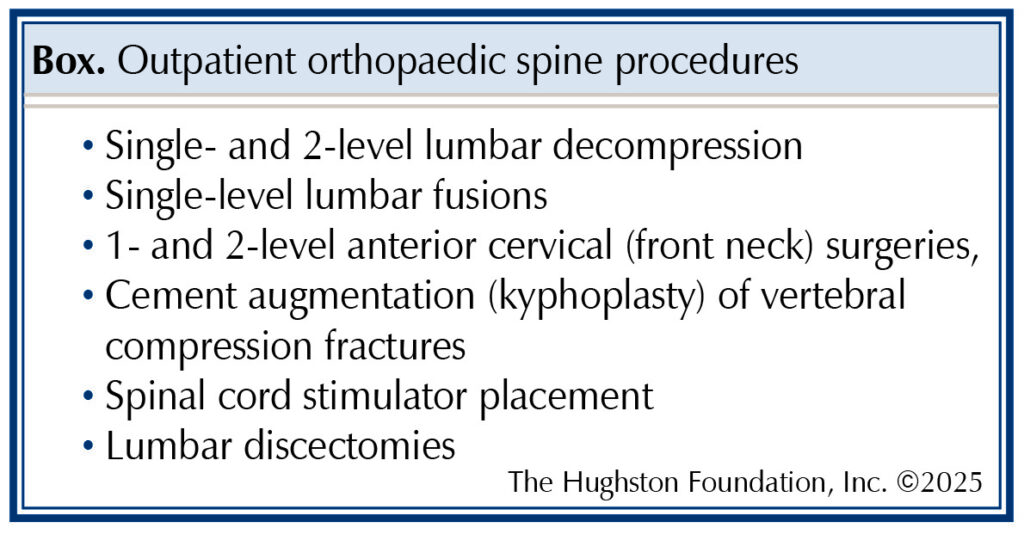
 Advances in minimally invasive techniques, pain management, and at-home-rehabilitation have contributed to the increase of spine surgeries performed in an outpatient setting. As healthcare costs continue to rise, and patients and providers try to minimize those costs, outpatient surgery has come into focus as a less expensive option.
Advances in minimally invasive techniques, pain management, and at-home-rehabilitation have contributed to the increase of spine surgeries performed in an outpatient setting. As healthcare costs continue to rise, and patients and providers try to minimize those costs, outpatient surgery has come into focus as a less expensive option.
Spine surgery is one of the largest fields of surgery in orthopaedics. Elective spine surgeries can correct a deformity or relieve pressure to compressed nerves and the spinal cord. Surgeons successfully complete single-level (the single disc space between 2 spinal bones) or multiple-level surgeries depending on the pathology (disease and its causes). Some of the procedures performed on 1 to 2 levels, for example, C5-C6 in the cervical spine or L4-L5 in the lumbar (lower back) spine, are appropriate for outpatient surgery.
What is outpatient spine surgery?
Outpatient spine surgery can be divided into same-day surgery or outpatient observation. In same-day surgery procedures, the patient is discharged home on the same day that their surgery took place, after the effects of anesthesia have worn off. Typically, for the doctor to discharge you home the same day, patients must tolerate eating, walk safely, urinate, and have good pain control. Surgeons can perform these types of procedures at surgery centers or hospitals.
Outpatient observation surgery, however, means that the patient will stay 1 night in the hospital. Your doctor will typically discharge you home the day following your surgery, provided you are ambulatory, have good pain control, are voiding, and tolerating a diet. Surgeons often perform this type of surgery at a hospital, although some surgery centers have the ability to monitor patients overnight.
What are the benefits?
The most obvious benefit of outpatient spine surgery is that you get to recover in your own home. Since you can go home the day of or the day following your procedure, it places you in charge of your recovery. This means that you do not have to rely on calling for the nurse for pain medications, allowing you to stay ahead of your pain more efficiently. Likewise, there is less disturbance, particularly at night, as you sleep and recover. Finally, minimizing the time you spend in the hospital minimizes the risk of developing an infection in the hospital.
Cost savings is another important benefit of outpatient spine surgery. Multiple studies have looked at outpatient spine surgery in the setting of cost savings. These studies have shown anywhere from $4,000-$41,000 in cost reduction for procedures performed in a surgery center versus a hospital setting.
There is a lower readmission rate to the hospital following outpatient spine surgery in the lumbar spine and some studies have shown a lower rate of complications associated with outpatient surgery. However, additional studies are needed to confirm these statements.
Outpatient spine surgeries
Procedures with minimal blood loss and small incisions tend to be less painful, have a low risk of serious complications, and receive insurance approval for outpatient surgery. Currently, orthopaedic spine surgeons can perform the following procedures on an outpatient basis:

Who qualifies for outpatient spine surgery?
The surgeon will first consider the patient’s pain tolerance, medical condition, overall health, and presence of a caregiver at home. True outpatient (discharged home the same day) surgery is often limited to patients who are physiologically young, have few or no medical comorbidities (co-occurring medical conditions or diseases), to include psychiatric issues, and have a reasonable tolerance to pain. Additionally, the procedure must qualify for an outpatient procedure by the insurance carrier.
Outpatient-observation surgeries, however, can be performed on a larger number of patients, as these procedures have the benefits of early discharge in addition to the services that hospitals offer. Typically, older patients with a few medical comorbidities can safely have outpatient-observation surgery.
Prior to any procedure, you will see your medical doctor, who will clear you, meaning it is safe for you to have the surgery. This medical clearance will help you and your surgeon decide whether outpatient spine surgery is right for you.
Preparing for outpatient surgery
The most important aspect in preparing for outpatient surgery is a discussion with your doctor. You and your surgeon should be comfortable with you going home on the day of or following your procedure. It is important that you know what to expect from the surgery, and to have an understanding of the potential complications. This will give you peace of mind when returning home.
You will also need to have your home prepared for your arrival. This means minimizing trip hazards such as removing loose rugs or cords and having someone take care of your pet. Some patients may have difficulty with stairs for the first few days, thus having a place to sleep on the ground level floor is important. Ensure that you have picked up your discharge medications prior to your surgery, so that you can stay on top of your pain control. Typically, your physician will discharge you with a narcotic and muscle relaxant. Finally, mobilization is very important following spine surgery. Make sure there are clear paths through your home so you can walk and move frequently, and eat meals in a place other than where you are otherwise recovering.
Surgeons are performing outpatient spine surgery on an increasing basis around the country. The type of procedure you need is the main determinant, but multiple patient factors should be considered while planning your surgery. If you are preparing for spine surgery, discuss all options with your surgeon, to see if you qualify for an outpatient procedure.
Author: Matthew Griffith, MD | Columbus, Georgia
Last edited on July 15, 2025